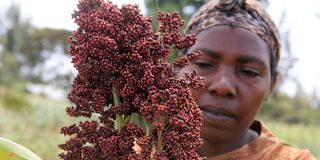Women empowerment holds the key to food security in Kenya and Africa

A farmer harvests sorghum at Honi village in Nyeri county on June 26, 2014. The conditions under which women participate and work in agrifood systems often are unequal, and there are a number of gaps in women’s access to important resources and assets, as well as discriminatory social norms and policies.
It is a fact that 66 per cent of women in sub-Saharan Africa work in agrifood systems, and that agrifood systems are a more important source of livelihood for women than men in many low-income and middle-income countries.
Despite this, the conditions under which women participate and work in agrifood systems often are unequal, and there are a number of gaps in women’s access to important resources and assets, as well as discriminatory social norms and policies, which, if not addressed, may slow the realisation of food security.
Agrifood systems, especially in African countries, have suffered multiple shocks through adverse climatic phenomena brought about by climate change, which has resulted in increased frequency and severity of droughts, floods and animal and plant pests and diseases.
Covid-19 pandemic
This has been worsened by the Covid-19 pandemic and the war in Ukraine, which has resulted in high food prices and economic slowdowns.
Rural-urban migration, which is on the rise in Kenya, has further destabilised agrifood systems — piling more stress on rural women.
Out of a total population of more than 51 million Kenyans, more than 32 per cent now live in cities and urban centres.
This denies the agricultural sector much-needed rural labour while at the same time stressing urban food systems with an increasing number of mouths to feed every passing day.
A recently released report on the Status of Women in Agrifood Systems by the Food and Agriculture Organization of the United Nations (FAO) sheds light on these challenges and what needs to be done.
The report states that women in agrifood systems tend to occupy vulnerable, irregular, informal, part-time, low-skilled and labour-intensive roles.
Despite these facts, 70-80 per cent of agricultural production in Kenya is done by women.
Evidence shows that despite women’s substantial contribution to agri-food systems, there are perpetual barriers and challenges that need to be addressed.
Key among the many issues women face is the limited access to resources such as land, secure tenure, productive assets, credit and regulatory rights, and fair wages.
Preliminary findings show that where women have been supported to access climate-smart farming skills, access to credit, supported to formalise groups/cooperatives and received productive assets such as solar-driven chicken incubators, solar pumps for micro-irrigation, improved poultry and dairy goat breeds, there have been a triple increase in household food security, improved family nutrition and income.
Affirmative action
I am convinced that Africa’s future prosperity will depend on affirmative actions that support women’s role in agri-food systems.
FAO estimates that by closing gender gaps in the factors that drive wages and productivity, it is possible to generate additional global economic activity worth nearly $1 trillion dollars, nearly a third of Africa’s GDP, with the bulk of the gain going to countries that are the most vulnerable to hunger.
Key actions towards closing the gender gap in agri-food systems will require the economic empowerment of women, enhancing their skills and knowledge and ensuring equitable employment opportunities.
Other crucial interventions include strengthening women’s leadership skills, improving social protection and access to productive services, as well as addressing gender-based violence and social norms.
There is also a need to strengthen data collection and analysis on agri-food systems.
Fixing these problems will not be simple and will necessitate engaging all stakeholders, yet evidence shows progress is eminently feasible.
Sustainable world
Gender equality as highlighted by the United Nations through Sustainable Development Goal 5 is not only a fundamental human right but a necessary foundation for a peaceful and sustainable world.
The report brings this to life by noting that with equality in access to resources and services, rural women involved in agriculture will directly contribute to food security.
The good news is that helping women in agrifood systems will bring fruit in the form of greater food production, improved nutrition and better lives for all.
The bottom-line is the need to prioritise women’s empowerment in agrifood systems to enable them to overcome the inequalities that threaten food security and nutrition. Women have always worked in agrifood systems, and it is time that we make sure agrifood systems work for women.
This is especially necessary in the developing countries like Kenya.
Carla Mucavi is the Food and Agriculture Organization of the United Nations Representative in Kenya; [email protected]




